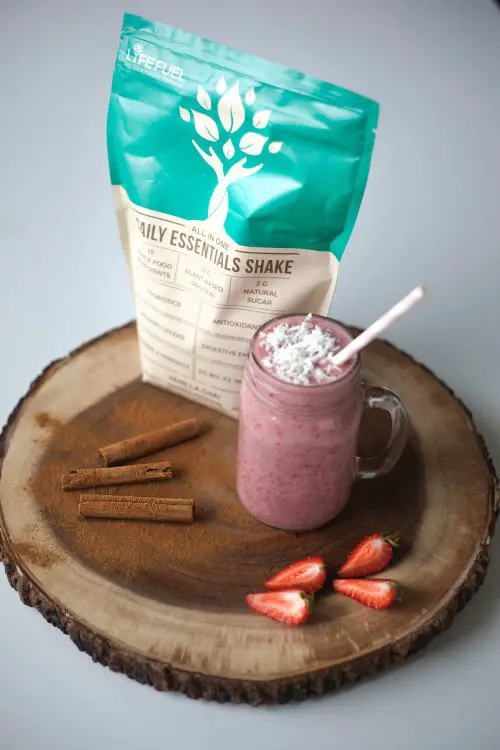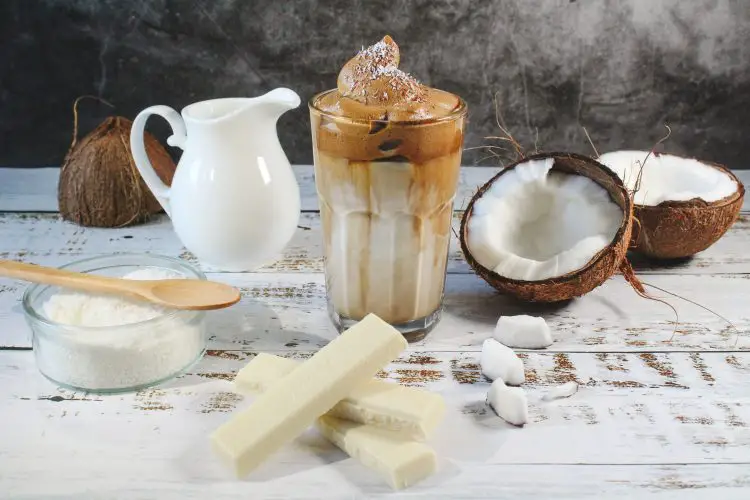Hey Beautiful! This site is reader-supported and we earn commissions if you purchase products from retailers after clicking on a link from our site.
Protein powder is becoming increasingly popular as we become more and more aware of the importance of incorporating protein into our diets. Protein is so vital for muscle development and muscle repair. So for anyone who exercises regularly, protein can be an excellent way of maintaining muscle whilst also helping to repair and heal muscle injuries or aches that can occur from exercising.
When it comes to protein powder, there are so many different types out there, as well as flavors and base ingredients. Not only can it be difficult knowing which one to get, there are a number of rumors and suggestions regarding the best way to take protein powder. Many people taking protein are often on a diet, so it is common to see people mixing protein powder with water to save on their calories. However, protein powder can be known to create a delicious shake. For those consuming extra calories, mixing protein powder with milk is said to be a great way to not only make the protein more delicious, but to incorporate some extra calcium whilst doing so.
Today I am going to try and answer the question of ‘can you mix protein powder with milk?’. We’ll be looking at both a range of protein powders and a range of milks, and assessing if there is a specific way you should take it.

Briefly About Protein Powders
What is whey protein powder?
There are many protein powder types out there, but one of the most common protein powders is whey protein powder. This is a protein made with whey as its base. Whilst this is not vegan, many people opt for whey protein. This is because typically it can be extremely high protein but still remain reasonably low calorie.
Whey is a byproduct of milk and so the protein comes from the same source of protein in milk. You can typically gain around 20g protein from just once scoop, worth around 90 calories.
Whey protein is an excellent and easy protein supplement. As it is such a popular product there are so many different variations on the market, making it something that lots of people can enjoy.
What is vegan protein powder?
Vegan protein powder, on the other hand, is more often than not a pea-based product. This means that it is plant-based, as opposed to seeking its protein from an animal.
Whilst this is a great option for those on a vegan diet, it is often lower in protein and higher in calories, making it slightly trickier to hit protein goals with a low calorie intake.
Alongside this, pea protein has a particular taste, even when flavored. So many people who try and incorporate vegan protein powder into their diet find it trickier to do so.
Because of this, it is important to find new ways to mix protein powder and high the distinct flavors.
What to Mix Protein Powder With
For the purpose of this article, I am going to focus on whey protein due to popular demand. However, whatever goes for whey protein is usually the case for other protein powders too. If you can mix whey protein, it is likely you can mix your other types of protein too. Feel free to use this article for guidance.
Can you mix whey protein with water?
In simple terms, yes. This is one of the most common ways to incorporate whey protein into your diet. Mixing whey protein with water is a fantastic way to get your protein without adding extra calories to it.
This, of course, depends on your preference of flavor. Not all flavors are for everyone. Thus, adding other ingredients to your shakes may be beneficial if you want to hide the flavor.
It is also important to remember that whey protein denatures at 100 °C and so you may completely destroy the nutritional value of your protein by adding water that is too hot.
Can you mix protein powder with milk?
This overarching question has a simple answer – yes.
However, mixing protein powder with milk comes with its pros and its cons. When it comes to what to mix protein powder with, there is still a lot of debate going on.
Can you mix whey protein powder with milk?
Again, this is an extremely popular way to drink whey protein powder. It not only adds calcium, but with certain flavors such as chocolate and strawberry, your protein powders can often end up being a high-protein, tasty milkshake alternative.
As whey protein powder is a milk-based product already, the protein often mixes well with milk and so drinking it this way can be a lot more delicious than simply watering it down.
Can we mix whey protein with hot milk?
If mixing your whey protein powder with hot milk, or anything hot for that matter, it is important to mix the powder with a small amount of room temperature water first. This helps to create a paste and prevents the protein from going lumpy in the hot drink.

Can we take whey protein with milk at night?
Despite many common misconceptions, eating or drinking anything at night makes no difference to if you have it during the day. Weight loss is all down to calorie intake and so staying within your calories is what matters, not the time of day you have them.
However, protein can be quite filling. It is a good idea to have protein before or after you exercise, as your metabolism has kicked in and it will help break down and distribute the protein around your body.
That being said, if it is late at night and you have realized you haven’t yet hit your protein goals or consumed all of your calories, there is no harm in having a whey protein powder drink with milk. In fact, it is better to have your recommended protein intake, even if it is right before bed.
Can you mix whey protein with creatine with milk?
There is nothing wrong with mixing both creatine and whey protein with milk. In fact, some supplements out there actually contain both creatine and whey protein together, and this can then be consumed by mixing with water or milk, much like a regular protein shake.
Simply add a scoop of creatine into your whey protein powder shake and you will be reaping the benefits from both powders. It makes no difference if you put them into your body separately or together, so if you are going to have both then you may as well have them in one drink.
Can you mix plant protein powder with milk?
It has already been mentioned that mixing plant protein powder with milk can be done if you are using a plant-based milk.
Of course, plant-based protein can be mixed with regular milk as well, but this would be diverting away from a vegan diet and so for those who are taking plant-based protein powder due to being vegan, it would not be a smart move to mix it with cow’s milk.

Milk Types
So, now that we know the different ways and types of protein powders that can be mixed with regular milk, it is important to look at the different types of milks and whether they are suitable to mix protein powder with.
Can you mix protein powder with almond milk?
Yes, there is absolutely nothing wrong with mixing protein powder with almond milk. In fact, almond milk is extremely low calories compared to other milks and so this is a fantastic way for those on a low-calorie diet to incorporate their protein.
Further to this, almond milk is suitable for vegans. So those who are consuming vegan protein powder can often add it with almond milk to ensure they remain on a vegan diet.
Can you mix protein powder with oat milk?
Oat milk is a fantastic replacement for regular milk. Again, it is vegan. But on top of this, oat milk actually contains more vitamin B-2 than cow’s milk. So it’s a great way to get in more VB2 if this is something that is lacking in your diet.
Oat milk is not as low calorie as almond milk. But it does have alternative nutritional value and so changing up your milk choices can be a great way of getting multiple nutritional benefits.
Can you mix protein powder with whole milk?
Lots of people choose to mix protein powder with whole milk. As mentioned, mixing protein powder with milk can be a great way of making your protein shake taste better, as using full-fat milk really takes the lead on this.
Whilst it is important to remember the calorie increase of using whole milk, for those who have room for more calories, whole milk can be one of the most delicious milks to combine with your protein powder.
Can you mix protein powder with coconut milk?
Much like almond milk, coconut milk is one of the lowest calorie milks available. Not only is coconut oil good for cracked heels you may get from an intense workout, coconut milk is also very useful. Coconut milk can be an amazing way to create a tasty, creamy shake with hardly any extra calories.
The flavor of coconut milk can combine very well with certain protein powders such as chocolate and caramel. Not only can it taste amazing, but coconut milk is full of electrolytes and can be a great way to boost your metabolism and immune system.
However, the taste of coconut milk can be somewhat overpowering. So if you are using a flavored powder that may clash with coconut, or if you are not a fan of coconut, then using coconut milk for your protein powder shakes would not be recommended.

Can you mix protein powder with soy milk?
Like all other plant-based milks, protein powder can be mixed with soy milk as well.
Soy milk has many nutritional benefits. So switching between various milks with your protein shakes can be a good idea.
Soy milk also has a distinct taste. It is important to consider this when using soy milk as the base for your whey protein powder drinks.
Should protein powder be mixed with milk or water?
Mixing protein powder with milk or water is equally safe. It really just depends on your personal preference and what you are trying to achieve from drinking protein powder.
If you are on a vegan diet, it is better to mix your protein with a plant-based milk or water. This is, of course, to ensure the drink remains vegan.
If you are on a low-calorie plan, using water to mix your protein powder is the best way to keep calories down. Although some people find this isn’t as tasty. Thus, using a low-calorie milk such as almond milk or coconut milk can be the best option.
If you are not watching calories, it really depends on your personal preference. Using milk can create a creamier, more enjoyable drink, but finding a milk that’s best for you is important.
If you are bulking, using a full fat milk would be the best option. You will not only gain more calories, but you will gain even more protein from the milk, more calcium and overall more nutritional benefits than using water.
Both is Good!
In conclusion, mixing protein powder with milk is an extremely popular method. Finding a milk you like is important. However you can also gain a lot of nutritional value by changing milks and reaping the benefits from each individual type of milk.
If you are vegan, remember to stick to a plant-based milk, and if you are low-calorie, consider sticking to water!
Either way, find a flavor, a brand and a milk you like. You will be good to go!
FAQs
No, drinking milk with protein powder can have many health benefits.
Mixing protein powder with chocolate milk can be a great way to not only get some extra calcium, but to also disguise the flavor of your protein powder if you are not a big fan of it.













